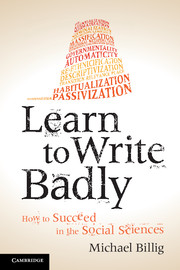Book contents
- Frontmatter
- Contents
- Acknowledgements
- 1 Introduction
- 2 Mass publication and academic life
- 3 Learning to write badly
- 4 Jargon, nouns and acronyms
- 5 Turning people into things
- 6 How to avoid saying who did it
- 7 Some sociological things: governmentality, cosmopolitanization and conversation analysis
- 8 Experimental social psychology: concealing and exaggerating
- 9 Conclusion and recommendations
- References
- Index
7 - Some sociological things: governmentality, cosmopolitanization and conversation analysis
Published online by Cambridge University Press: 05 June 2013
- Frontmatter
- Contents
- Acknowledgements
- 1 Introduction
- 2 Mass publication and academic life
- 3 Learning to write badly
- 4 Jargon, nouns and acronyms
- 5 Turning people into things
- 6 How to avoid saying who did it
- 7 Some sociological things: governmentality, cosmopolitanization and conversation analysis
- 8 Experimental social psychology: concealing and exaggerating
- 9 Conclusion and recommendations
- References
- Index
Summary
At this stage, I need some more examples. My general strategy, so far, has been to take examples where I find them, although on occasions I have departed from this strategy. As I have been writing about the ways that academics use language, inevitably many of my examples have come from academic experts in the study of language. Accordingly, there is a nagging doubt whether my choice of examples might reflect this particular field and that the writings of social scientists from other areas may be free from the faults which I have been criticizing. To quell this doubt, I must look at a wider set of cases.
I cannot cover all the social sciences, so in this chapter I will be concentrating on sociology, and I will be suggesting that sociologists, through their use of nouns, can rhetorically create sociological things, whose reality they uphold. I still have a problem with how to select my examples. It would be wrong to go searching for poor quality articles from obscure journals and then to declare self-righteously: ‘Isn’t it awful? I told you so!’ I will need to ensure that I am taking good quality examples from significant bodies of work.
- Type
- Chapter
- Information
- Learn to Write BadlyHow to Succeed in the Social Sciences, pp. 143 - 175Publisher: Cambridge University PressPrint publication year: 2013



